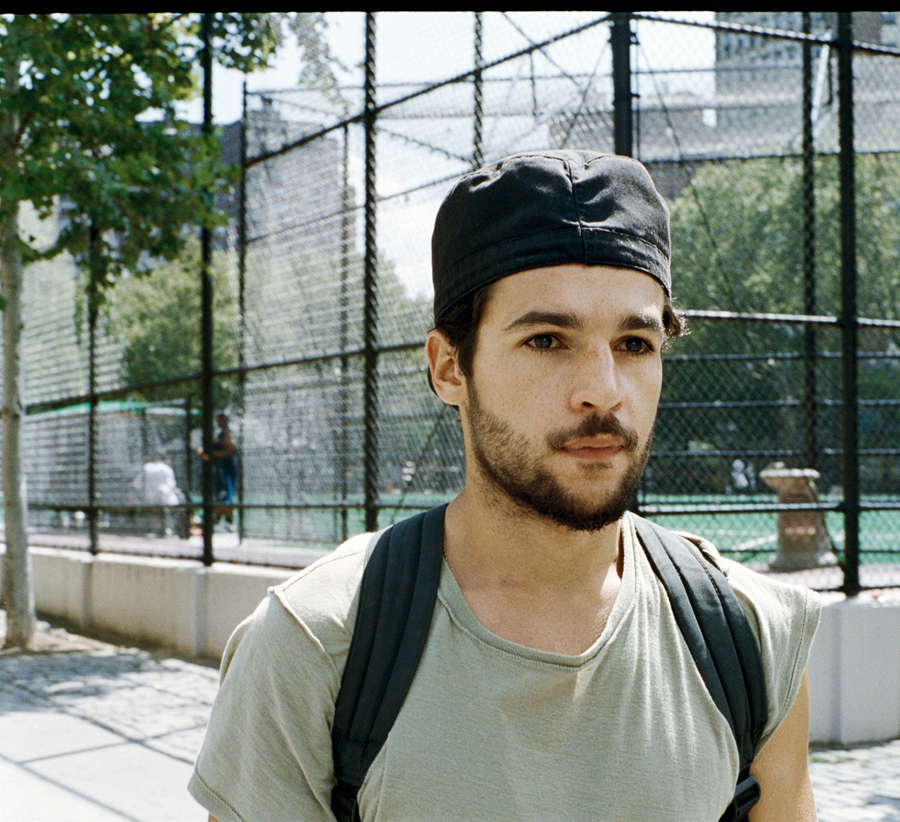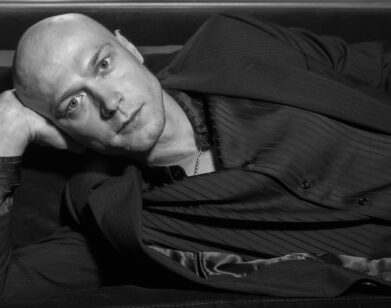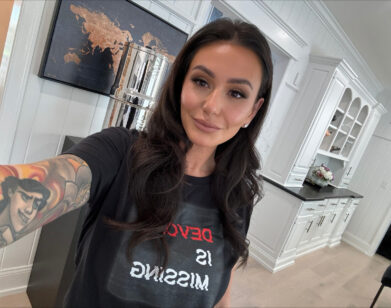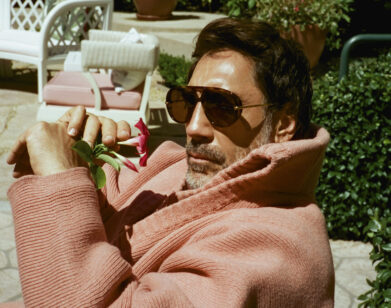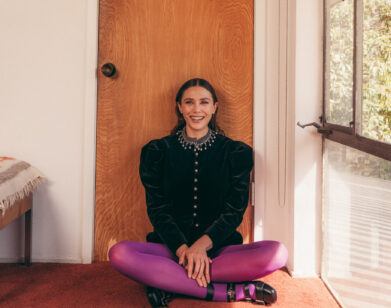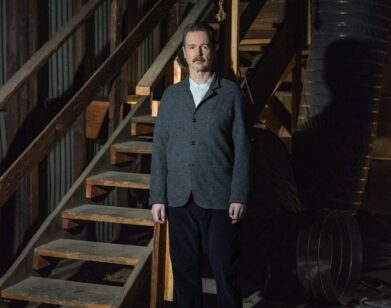Christopher Abbott’s Comings and Goings
Though relatively new to the big screen, Christopher Abbott has already proven himself to be a versatile actor with a flexible range. The 26-year-old—familiar from a slew of theater roles (including The House of Blue Leaves, alongside Ben Stiller, Jennifer Jason Leigh, and Edie Falco), last year’s cult drama Martha Marcy May Marlene, and, most notably, as nice-guy Charlie on HBO’s Girls—brings an adept, nuanced presence to his second feature film, Hello I Must Be Going.
Directed by Todd Louiso and written by Sarah Koskoff, Hello is an understated, slightly melancholic portrait of the path to emotional recovery in the wake of romantic malaise. Amy (played by Kiwi character actress Melanie Lynskey), moves back in with her parents (Blythe Danner and John Rubinstein) in tony Westport, Connecticut after a particularly messy divorce, without plans or prospects. After spending months wallowing in ratty t-shirts and Marx Brothers films, Amy makes her first public outing to a dinner party thrown by a family friend, where she meets Jeremy (Abbott), a 19-year-old former child actor disillusioned with his profession. The two embark upon a heated sexual relationship tempered with genuine affection, giving Amy her first taste of adult love, as well as the jump-start she needs to embrace a path of self-discovery.
While taking a break from shooting the second season of Girls, Interview caught up with Abbott to discuss the audition process, Jeremy and Amy’s relationship, playing a younger guy, and the differences between stage and screen.
COLLEEN KELSEY: How did you first get involved with the project? Did you audition?
CHRISTOPHER ABBOTT: Yes, I auditioned. Todd Louiso, who’s the director, was there. There were quite a few audition scenes, and aside from enjoying just reading the scenes and liking the dialogue, Todd had a very warm energy in the audition room, which is kind of refreshing, because auditions can be weird. They’re weird scenarios, so it’s always nice when someone is very generous and human. I felt that from him from the get-go. Even afterwards, I felt good with it. He gave me a hug after, so that was kind of nice. [laughs] He had that genuine quality that I really liked.
KELSEY: What was it about Jeremy that you found attractive as a character?
ABBOTT: The thing is, when I first read the first bits of it, he was 19 years old. I’m going to be 27 soon. So, my first instinct was, “I don’t know if I can even do this. I don’t think I can play it.” As I kind of got further along with the script, I liked it because, first of all, I felt he was much more mature than his age, but still naïve enough to have a lot of life to learn about, but eager to [learn]. It was also the rapport that he had with the character Melanie Lynskey played, that I really liked. It felt very real and very human and unique. The themes are universal. Two people fall for each other. That’s common, you see that a lot in movies, but just the way they went about it, they had a nice, slow, genuine, vulnerable way of speaking with each other. That I liked a lot.
KELSEY: You and Jeremy are both actors. Did you find yourself relating to and empathizing with any of his difficulties with embracing his craft?
ABBOTT: Yeah. I guess I would agree for myself. I love doing it, and so does Jeremy. But then there’s all these other things about it that go along with the business of acting sometimes that you don’t necessarily relate to. I guess I would relate to the questions you would have when you’re doing something like that. You love what you’re doing, but then all these other things kind of come along with it, and you can’t help but question it sometimes. I’ve done that. I fell in love with the art of doing it and as the years have gone by, you have some experiences and you meet people that you really don’t relate to. [laughs] Then at the same time, I’ve met people that are extremely, dear friends of mine, like the guys I did Martha Marcy May Marlene with, all those dudes. Brady Corbet, he’s one of my closest friends. Because of situations like that, I can never knock it, but there are some things about it, there are some people, where you think, “How are we in the same world?” But I think that happens with every kind of job.
KELSEY: In addition to the television and film work that you’ve done, you’ve also done quite a bit of stage acting. Do you approach the two differently?
ABBOTT: I started off doing mostly just plays. The first couple years was really just theater. I’ve gone kind of back and forth. Doing a play, you have a little bit more time, obviously. You rehearse for a month before you get up in front of people. It’s a totally different energy. With film, TV, you want to try to capture lightning-in-a-bottle moments. I don’t try to rehearse as much with that stuff, because you want those sparks of something to come out, if they do. You don’t want it to get stagnant. It’s weird. But with a play, you have those same moments early on in rehearsal, and then I feel then there’s a couple weeks during the rehearsal period where you fall back and it starts to feel stagnant and strange, but then you keep laboring on these scenes and the work in this play, it kind of comes full circle again. So, what ends up happening is you’re so rehearsed, all the lines and what’s going on with these characters becomes so ingrained, that those moments kind of happen again. You find very new moments, and I think that’s pretty exciting.
KELSEY: And it’s also the experience of playing with consistency every performance.
ABBOTT: And only those people in that room see it that one time, which is kind of fun, but sometimes just sucks because you can have a good show, you know, but then it’s over, and then you have to do it again. And then you can have a shitty show the next night and you’re like, “Ah fuck, I wish all these people came to last night’s show.” That’s kind of what makes it fun.
KELSEY: To get into the character of Jeremy, did you regress yourself back to 19 and channel what you were thinking or experiencing at that age?
ABBOTT: Not too much. Certain things, like the naïveté of him, I would kind of see where I was. I guess I was, on a maturity level, in a similar place. Because I am older, I didn’t want to play younger. I didn’t want to try and play a 19-year-old, because he wasn’t, really. I didn’t want to go back and play myself at 19. I kind of tried to play it more just straight. He was extremely mature for his age, and I’m older, so it kind of worked out that way.
KELSEY: I think the interesting thing about Amy and Jeremy’s relationship is that they’re both at these transitional moments. They do have a notable age difference, but it’s almost a nonentity; they have a pretty much egalitarian relationship. Do you think because they’re both looking for their own identities and trying to establish themselves, that’s one of the reasons they come together?
ABBOTT: Yeah. It’s a mixture of right place, right time and wrong place, wrong time. The time that they spent together, in the film, kind of lives in both those worlds, because they are in very similar places, they both know in the back of their heads that this can’t happen. There needs to be a bit of a balance, usually, and if you have these two people that are kind of going on the same path, they can relate to each other for those things and can help each other out, but ultimately, in those cases, they have to keep going.
KELSEY: Did you and Melanie have a lot of bonding time?
ABBOTT: We didn’t have that much time before we started filming, just one day for a few hours. And then we pretty much met right when we started shooting, and, luckily, the dinner where we first meet is the first thing that we shot together.
KELSEY: Jeremy and Amy go into this very intense physical relationship, right from the get-go. Did that first meeting, the dinner scene, serve as bit of a buffer?
ABBOTT: That was nice, to at least be able to do that, to have the energy of the first meeting. Some of it was real, because I only met her once, we didn’t know each other that well. Before getting into the stuff, the weeks ahead, we had a very practical conversation. We both realized, this is a weird thing, you’re doing sex scenes and very intimate scenes with someone, and you don’t actually know the person yet. But your duty as an actor is to try to make it as real as possible. We had a practical conversation, “If anything’s uncomfortable, let me know, blah blah.” From then on, the rapport grew between me and her as people, and it also grew for what we had to do in the movie, and that was nice. You don’t want to force that kind of rapport, because then it just feels forced, but I guess there’s something in the back of your head, “You want to make this movie good,” and you want to make these scenes feel as real as possible, so there’s something in the back of your head that rushes a rapport and a relationship between two people, and I think that happened in a healthy way.
KELSEY: Where do you see Jeremy and Amy going, moving forward?
ABBOTT: I think they’re both pretty smart people. I think they’re the kind of characters, those people that you meet and you’re like, “Oh, they’ll be fine. Eventually.”
HELLO I MUST BE GOING IS OUT IN LIMITED RELEASE TODAY.

